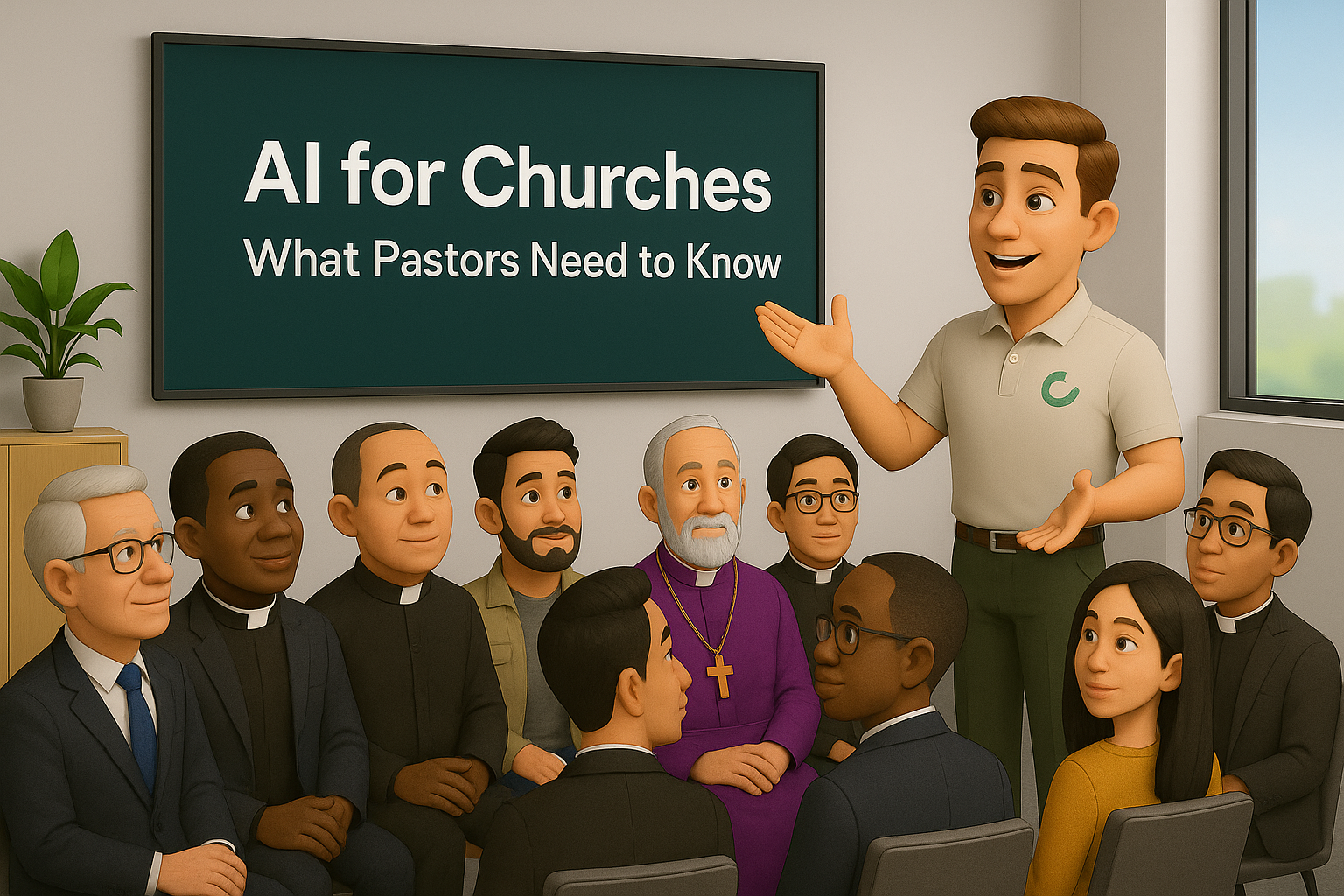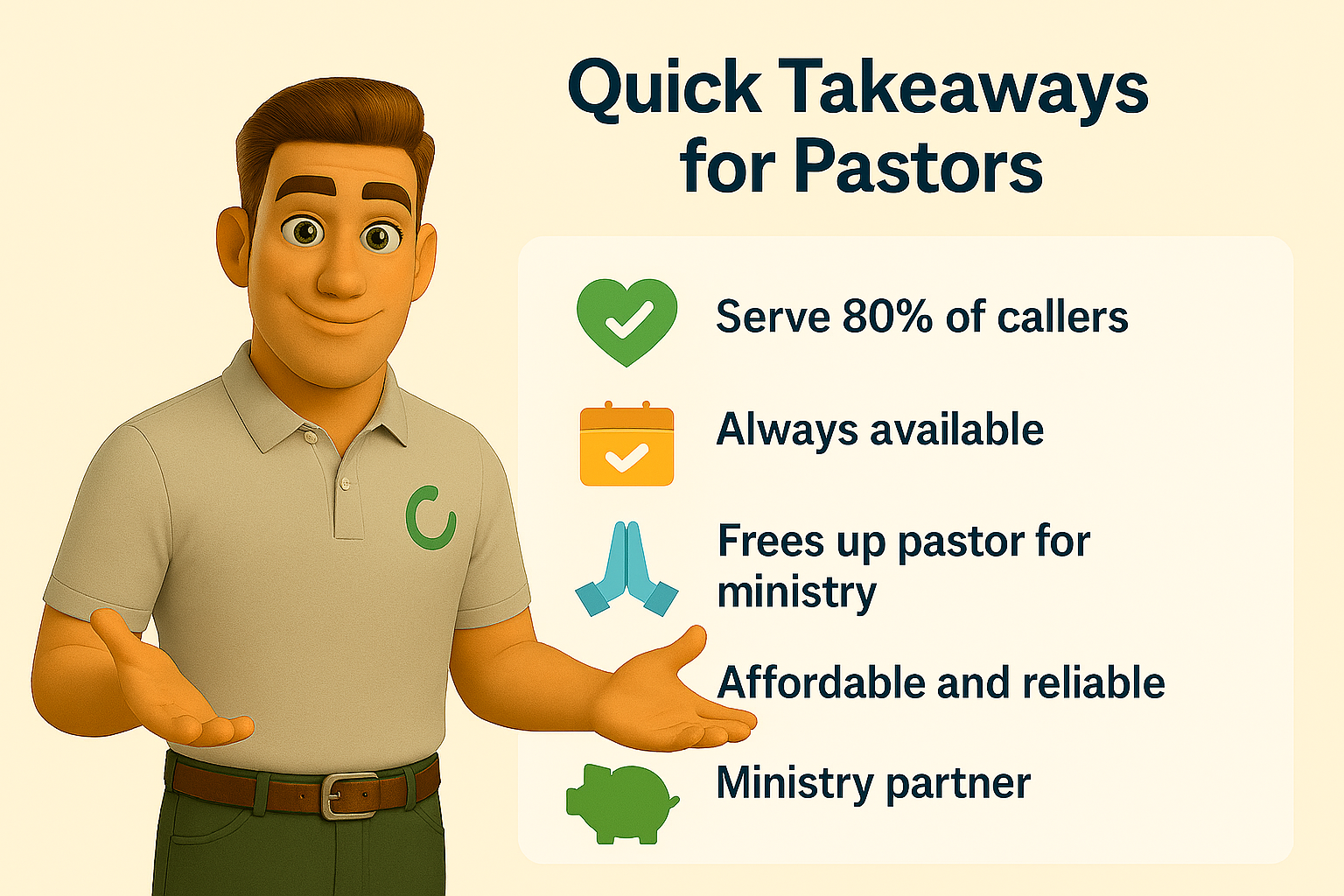
Pastor David sat in his office staring at another missed call notification. Third one this morning. Between preparing Sunday's sermon, visiting Mrs. Murphay in the hospital, and the board meeting tonight, he couldn't even think about answering the phone.
"What if that was someone in crisis?" he wondered. "What if that was a visitor with questions about this Sunday?"
Sound familiar? You're not alone. While technology companies are racing to implement AI everywhere, most pastors are asking a simpler question: "How does this actually help my ministry?"
At ChurchCalls.ai, we talk to pastors every day who feel caught between two worlds. You know your congregation needs better communication, but the technology landscape feels overwhelming. You're already stretched thin, and adding "learn about AI" to your plate feels impossible.
Here's what we've learned: AI isn't about replacing the human heart of ministry—it's about giving you more space to do what only you can do.
Let's start with some honest data about where churches stand with communication:
The most comprehensive study by Barna Research Group found that 55% of Protestant churches could not be reached by a human being during business hours within five call attempts across 3,400 surveyed congregations. Even more concerning, 19% of churches had neither a person nor answering machine responding to calls.
But here's what's encouraging: growing churches retain 20-21% of first-time visitors compared to only 9% retention in non-growing churches, with follow-up communication playing a pivotal role in this difference.
70% of all U.S. churches have 100 or fewer weekly attendees, and only 20% of churches have two or more paid staff members. If this describes your church, you're in great company—and you're facing the same communication challenges as thousands of other faithful congregations.
Over 40% of single-staff pastors are forced to supplement church income, which means finding time for phone calls between your "church job" and your "paying job" becomes nearly impossible.
Research shows 67% of people hang up if they can't speak to a real person when calling organizations. For churches, this means potential members, people in crisis, and community members are lost immediately when calls go unanswered or reach only voicemail systems.
During COVID-19, calls to telephone pastoral care services increased 20% as communities faced unprecedented isolation and mental health challenges.

When we talk about AI for churches, we're not talking about robots taking over pastoral care. We're talking about reliable support that handles the routine so you can focus on the relational.
Think of AI phone agents like having a faithful volunteer who:
AI doesn't provide pastoral counseling, make theological decisions, or replace the human connection that makes ministry powerful. It creates space for more meaningful human interactions by handling the routine tasks that often overwhelm small church staff.
Modern AI phone agents sound remarkably human. Most callers can't tell they're speaking with AI—they just know someone answered helpfully and professionally. The technology has evolved far beyond robotic voices and confusing phone trees.
Your congregation already accepts automated systems for banking, appointment scheduling, and customer service. Church AI agents work the same way, just focused on ministry and community service rather than sales.
You don't have to revolutionize everything overnight. Start with basic information handling and gradually expand as your team and congregation become comfortable with the enhanced service.
Professional church answering services start at $38 monthly for 24/7 coverage. AI phone agents provide similar reliability at comparable costs. Compare that to hiring part-time staff ($1,200+ monthly) or missing visitors who could become faithful members and generous givers.
Focus on the ministry outcome: better service to your community. When members see that every call gets answered helpfully, and urgent needs reach you immediately, they appreciate the improved accessibility.
You don't need to. Just like you don't need to understand phone systems to use a telephone, modern AI agents are designed for pastors, not programmers.
AI handles information requests so you have more time for personal ministry. Instead of spending 20 minutes explaining service times, you can spend that time praying with someone who really needs it.
Here's what excites us most about AI in churches: it multiplies your ministry capacity without multiplying your stress.
When your phone gets answered professionally every time:
Churches that improve their communication accessibility see measurable improvements in visitor retention, community engagement, and overall ministry effectiveness.
How many ministry moments are being missed each week because your phone goes unanswered?
Not because you don't care. Not because you're not working hard enough. Simply because there are only 24 hours in a day and you're already using most of them to serve your congregation faithfully.
What would it mean for your ministry if every call was answered with care and competence? What would it mean for your community if they knew they could always reach your church when they needed help?
You're already doing incredible work with limited resources. AI isn't about fixing what's broken—it's about amplifying what's already working.
Rather than trying to explain how church AI agents work, we'd rather show you. We've created a live demonstration that walks through exactly how these conversations happen, how urgent calls get routed to you immediately, and how routine questions get handled professionally without interrupting your ministry time.
Ready to see how AI could support your ministry? Watch our live demo to understand exactly how this technology could fit your church's unique needs and culture—no technical background required.
At ChurchCalls.ai, we're your trusted partner for modern communication, bringing simplicity and innovation to your church's front lines. Our AI agents bridge the gap between tradition and technology, seamlessly integrating with your day-to-day operations while preserving the authentic human connection that makes ministry powerful.